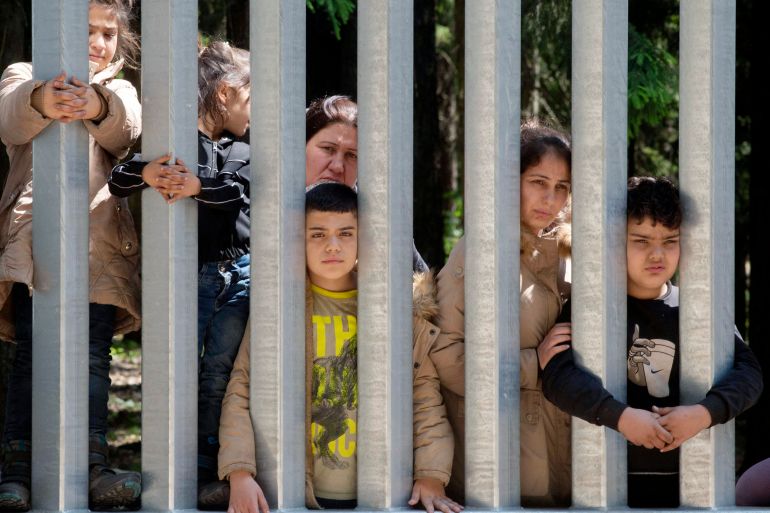Poland to temporarily suspend asylum rights amid Belarus border tensions
The move aims to curb a border crisis that Warsaw says has been orchestrated by Minsk and its ally Russia.
A group of some 30 people seeking asylum in Bialowieza, Poland, on Sunday, May 28, 2023 [ Agnieszka Sadowska/AP Photo]Published On 12 Oct 202412 Oct 2024
Poland is set to temporarily suspend the right to asylum as part of a broader strategy aimed at reducing irregular migration, driven by escalating tensions with Belarus.
The Polish government accuses Belarus of facilitating the movement of migrants across their shared border.
“One of the elements of the migration strategy will be the temporary territorial suspension of the right to asylum,” Prime Minister Donald Tusk said on Saturday.
“I will demand this, I will demand recognition in Europe for this decision,” he told a congress held by his liberal Civic Coalition (KO) grouping, the largest member of Poland’s coalition government.
Tusk said the right to asylum was being used by Belarusian President Alexander Lukashenko, Russian President Vladimir Putin and by people smugglers in a way that goes against the essence of the right to asylum.
Migration has been high on the agenda in Poland since 2021, when a border crisis resulted in thousands of asylum seekers, mainly from Afghanistan, Syria, and the Kurdish region of Iraq, attempting to enter Poland via Belarus.
Warsaw and the European Union said it was a crisis orchestrated by Minsk and its ally Russia.
Belarusian authorities, mainly via tourist agencies in the Middle East, promoted travel to Belarus while people smugglers led refugees and migrants to believe they could easily enter the European Union.
Thousands of people were issued tourist visas to fly to Minsk and then headed to the border with Poland.
Russia and Belarus have denied responsibility.
Tusk said he would present the migration strategy at a government meeting on October 15, the first anniversary of the election that brought the coalition he leads to power.
Donald Tusk in Lodz, Poland [File: Kacper Pempel/Reuters]
Anti-migrant rhetoric
Since taking office in December 2023, Tusk has pursued tough policies on migration.
This strategy has won broad public support, but has dismayed activists who had hoped he would abandon the previous, nationalist administration’s approach.
Marysia Zlonkiewicz from Grupa Granica, an NGO that helps migrants at the border, said suspending the right to asylum was against the constitution and would push migrants into the hands of people smugglers.
“Prime Minister Tusk is violating the constitution that he promised to defend … You cannot selectively exclude or deprive people of constitutional rights,” she told the Reuters news agency.
Polish border guards, November 2021 [Morten Risberg/Al Jazeera]
Poland has previously been accused of “pushbacks” of non-European refugees and migrants entering their country via the “red zone” – a 3km-wide (two-mile) strip running along the roughly 400km (249-mile) border with Belarus.
Al Jazeera spoke to migrants and refugees on the border in 2021 and 2022 who said they had been routinely pushed back towards the border with Belarus by Polish border guards.
The red zone was first introduced in 2021 but closed in 2022 after Poland began building a steel wall on the border.
It was reopened in 2024 after a Polish soldier was killed on the border.
